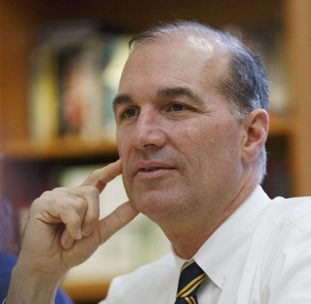
Quiet the Mind: Reflect, Forgive, Love

I am often asked if I have a favorite building on campus. The answer is easy: the Apthorp Memorial Chapel. I love the building’s aesthetic, its beautifully unfussy neo-Gothic style. Its facade stirs impressions of both church and castle; it speaks to me as a deeply spiritual and powerful edifice. The interior is exquisite in its simplicity: the stained glass window, the wooden pews, and the memorial plaques on the walls.
One of those plaques, located on the wall to the right on the approach to the altar, features a plain wooden panel inscribed with a name, dates, and a sailboat. The name is James Edward Bland ’58, my father, who passed away in 1974 when I was a young child. The chapel is the only place where my father is memorialized, and for decades I have visited this special place to reflect in the stillness and give my full attention to his memory.
I believe that there are few things more important than finding ways every day to quiet your mind, whether it’s by visiting a peaceful place like a chapel, exercising, meditating, or engaging in any number of practices that allow us to be fully present with our thoughts. My own practice includes exercising and taking the time to feel gratitude, forgiveness, and hope. These moments may not always produce calm and happiness for us. In reflection, we may ask ourselves tough questions. We may confront turbulent thoughts, feel deep emotions, and cope with our struggles, including the grief we feel for the loss of loved ones. The aim should be not to forget or ignore our troubles but to understand, to love, and to forgive ourselves fully, absent judgment or filter.
In his novel The Collected Works of T.S. Spivet, Milton alumnus Reif Larsen ’98, who served as our Commencement speaker in 2011, describes a moment in which the world is free from the noise and distraction we associate with everyday life: “Outside, there was that predawn kind of clarity, where the momentum of living has not quite captured the day. The air was not filled with conversation or thought bubbles or laughter or sidelong glances. Everyone was sleeping, all of their ideas and hopes and hidden agendas entangled in the dream world, leaving this world clear and crisp and cold as a bottle of milk in the fridge.”
In 2019, the ability to break away from that “momentum of living” requires resolve: Sometimes, we are gifted these moments in late nights, early mornings, and in nature, but most of the time, we must deliberately make space for them. In our hyper-connected world, these moments are increasingly rare and precious. And yet, they provide such important opportunities to check in not only with ourselves, but with others.
I think often of Merritt Levitan, Milton Class of 2013. Shortly after she graduated, Merritt was bicycling across the country when she was tragically hit and killed by a distracted driver. Merritt’s legacy lives on at Milton and in the movement her parents and classmates founded in her honor: TextLess Live More. This campaign, which has reached thousands of people nationwide, aims to end distracted driving. At Milton, TextLess Live More has affected our students in incredible ways: They not only pledge to drive without distraction; they commit to dedicating time without their devices. To spending time outdoors, playing tennis or lawn games on the Quad. To being present, for their own well-being and for the strength of their relationships with one another.
The breakneck speed of technological advances in our society is astonishing. We can work with people all over the world and hold seemingly infinite resources in the palms of our hands. Yet these same resources can also be a harmful distraction, producing an artificial connectedness that blinds us to reality and to the people right in front of us. Taking the time to seek quiet moments of reflection—to look up from our screens now and then—reminds us of the indispensable and irreplicable power of connecting in real time with ourselves and one another.




